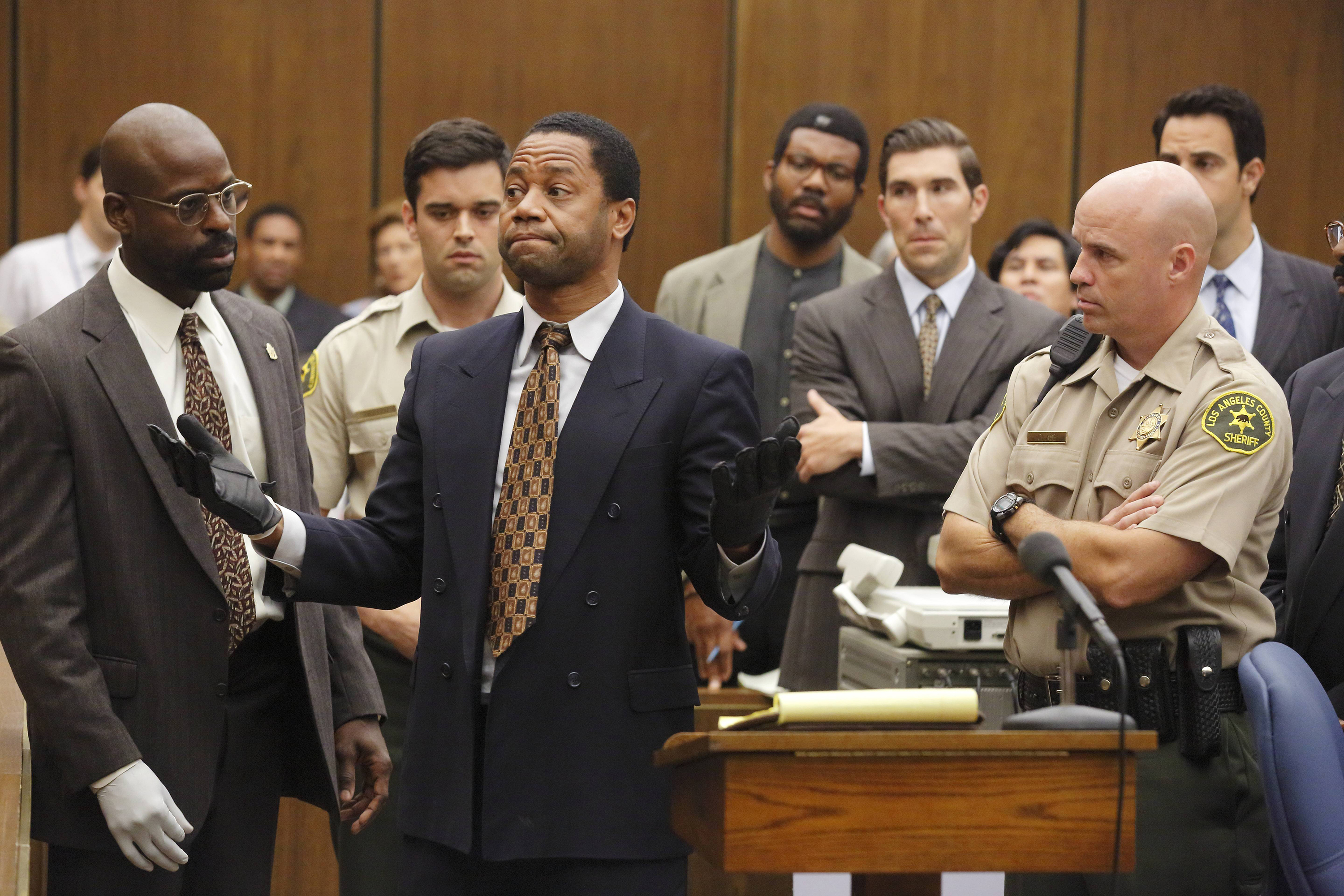The People vs. O.J. recap: If it doesn't fit...
The FX drama takes on the most iconic moment of the O.J. Simpson trial, but adds a few vaguely troubling implications along the way

I've been dreading this week's glove-centric episode of The People vs. O.J. since the series began. This is as good a time as any for some personal disclosure: I have no doubt whatsoever that O.J. Simpson is guilty of the murders of Nicole Brown and Ron Goldman. I suspect that many viewers will feel the same way after watching Marcia Clark's clear, evidence-based takedown against any LAPD-centric conspiracy theory. And what else is there? As Robert Kardashian remarks in a sudden crisis of conscience, this is the most scrutinized case in modern American history — and no one has come up with another suspect that's even remotely plausible.
For those who believe O.J. Simpson got away with murder, The People vs. O.J. is a tragedy, and it gets more painful with every episode that passes. Last week, that pain was personal, as the series took on the largely unacknowledged sexism directed at Clark. This week, the pain is procedural, as Chris Darden pushes recklessly toward a decision we already know is doomed: asking O.J. Simpson to put on the gloves that were used in the murder. It's the most dramatic, iconic moment in America's most dramatic, iconic trial. Just watch the original footage:

I don't know why Investigation Discovery bothered to splice in suspenseful-sounding music, because that clip is plenty dramatic on its own. There's the Bloomingdale's employee confirming that Nicole Brown purchased the gloves, which were exclusively available at the store. There's O.J., flanked by bailiffs, walking over to the jury box. And there's O.J. attempting to put the gloves on, mugging and smirking as he struggles to make the glove slip over his hand. Is it proof that O.J. is innocent? Of course not. But in the parlance of the trial, the optics could hardly be worse. We don't get to Johnnie Cochran's now-legendary quip "If it doesn't fit, you must acquit," which figured heavily into his closing arguments — but even without the cute line, the jury gets the message.
The Week
Escape your echo chamber. Get the facts behind the news, plus analysis from multiple perspectives.

Sign up for The Week's Free Newsletters
From our morning news briefing to a weekly Good News Newsletter, get the best of The Week delivered directly to your inbox.
From our morning news briefing to a weekly Good News Newsletter, get the best of The Week delivered directly to your inbox.
In the years since O.J. tried on the glove in court, numerous theories have been thrown out to explain why it didn't fit. Some have argued that the sanitary gloves, intended to preserve the evidence, added enough bulk to make a difference; others have argued that O.J. simply stretched his hand in a way that made the glove seem like it didn't fit. The prosecution later argued that the blood and the DNA testing had caused the glove to shrink. At the time, Chris Darden told Judge Ito that he suspected O.J.'s arthritis might have made his hands puff up to a larger-than-normal size. Much later, Darden made a more incendiary claim, stating his personal suspicion that the defense had altered the glove during a lunch break. And Marcia Clark offered her own personal recollection of the moment in a recent interview, which more or less gibes with the version we see in The People vs. O.J.:
We went to sidebar and the judge suggested that Simpson try on the glove. And I objected, on the record. I said, "No! No! It's not a proper experiment. The latex will screw up the fit." And Chris said, "Yeah, I want to do it." And then we step aside and had the biggest fight we've ever had about 10 feet away from the court reporter. [Vulture]
With no clear explanation for what exactly occurred, The People vs. O.J. opts for one of the more dramatic possibilities: that Robert Shapiro surreptitiously tried on the glove during the lunch break, realized it would never fit O.J., and led the defense in goading Chris Darden into getting O.J. to try it on in open court. And if that isn't what actually happened — well, this is a drama, not a documentary, and the creative license to tell a more lurid version is understandable, if not admirable.
But there's another category in which I'm increasingly skeptical of The People vs. O.J.: the sexual tension between Marcia Clark and Chris Darden, which comes to a head in "Conspiracy Theories." In a break shortly before the infamous glove-fitting, Chris and Marcia take an overnight trip up to Oakland to blow off some steam with a few of Chris' friends. After a boozy night at a bar, they head up to their hotel hallway, and a long, sexually charged moment passes before Chris reluctantly says good night. As soon as Marcia closes the door, he regrets not making a move — but by then, it's already too late.
So: Did Marcia Clark and Chris Darden have an affair during the trial, or even get close to having one? It's another question that's long on speculation and short on confirmed facts. Here's Marcia Clark's most recent comment on the subject, from that same Vulture interview:
A free daily email with the biggest news stories of the day – and the best features from TheWeek.com
I'm not going to answer because we both decided we just didn't want to give that subject any traction. And if we say one way or another it goes off to the races. So I'm going to continue on a long tradition of "no comment" regarding our relationship. [Vulture]
Frankly, I don't really care whether the real-life Marcia and Chris had an affair. What I do find a little troubling, however, is the greater implication of the way The People vs. O.J. plays out the aftermath of their near-miss hotel tryst. The loss of intimacy between Marcia and Chris is immediate. The next time they're in the office together, she coldly asks him to leave the door open, and they spend most of the following scenes arguing over whether or not O.J. should try on the gloves in the courtroom. Finally, Marcia snaps and pulls rank: "This is my case. You work for me here, and when I say we drop it, you drop it."
Of course, Chris ends up impulsively defying her, and the glove scene plays out the way we all know it will. But what is the underlying implication The People vs. O.J. is making here? That Marcia Clark's unusually hard-line treatment of Chris stemmed from her need to reassert herself after what seemed like a rejection? That Chris' subsequent defiance is somehow rooted in his desire to prove himself after fumbling his big moment with Marcia?
None of this is stated outright, but given the structure of the episode, it's hard not to look at this as The People vs. O.J. drawing a direct line between the fracturing relationship of the prosecutors and their subsequent loss of the O.J. Simpson trial. For a TV series that has taken so much care in rehabilitating commonly maligned figures on both sides of the trial — and pulling it off so successfully — it's a strangely insidious implication. It's one of the few moments so far when The People vs. O.J. has twisted the cold, hard facts to support the narrative, instead of the other way around.
Scott Meslow is the entertainment editor for TheWeek.com. He has written about film and television at publications including The Atlantic, POLITICO Magazine, and Vulture.
-
 Washington grapples with ICE’s growing footprint — and future
Washington grapples with ICE’s growing footprint — and futureTALKING POINTS The deadly provocations of federal officers in Minnesota have put ICE back in the national spotlight
-
 ‘One day fentanyl will come back — and there will be little anyone can do’
‘One day fentanyl will come back — and there will be little anyone can do’Instant Opinion Opinion, comment and editorials of the day
-
 15 years after Fukushima, is Japan right to restart its reactors?
15 years after Fukushima, is Japan right to restart its reactors?Today’s Big Question Balancing safety fears against energy needs
